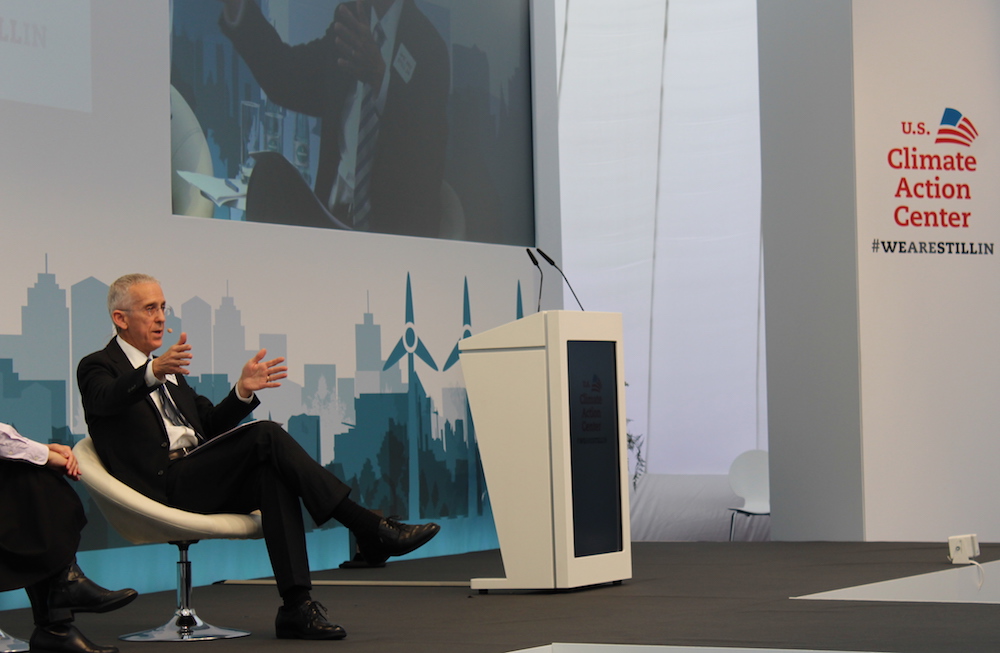BONN, GERMANY – Even if Donald Trump successfully withdraws the U.S. from the Paris climate accord in the next three years, Todd Stern, former climate envoy under Obama, doesn’t think the country will be gone from the agreement for good.
“I just firmly believe the U.S. will be back in,” he told attendees of the United Nations climate talks in Bonn, Germany. “I don’t know exactly when that will be, obviously, but we’re gonna be back in.”
That’s for at least a few reasons, he says. “There is very broad support within the U.S. for Paris.”
In May, a survey by the Yale Program on Climate Change Communication found that 7 in 10 U.S. voters support the country remaining a part of the Paris pact which resolves to reduce planet-warming emissions.
“The Trump administration’s efforts to roll back climate policies are at odds with a growing majority of the American public, who want more, not less action,” said Anthony Leiserowitz, who led the survey.
And that’s a message that has been repeated over and over again at the Bonn climate talks (known as COP23), by people and groups ranging from Arnold Schwarzenegger to the NAACP.
In one of the latest shows that the Trump administration’s stance at these negotiations is not representative of all U.S. citizens, a coalition of groups calling themselves the U.S. People’s Delegation delivered a petition outlining support of the Paris Agreement and signed by 1.1 million Americans to the secretariat of the UN climate talks.
A coalition calling itself the U.S. People’s Delegation delivers a petition signed by 1.1 million Americans supporting the Paris Agreement to the UN climate talks secretariat. Credit: Ashley Braun, DeSmog
These Americans joined the pledges of more than 2,500 cities, states, businesses, universities, and faith groups to support climate action to meet the 2015 Paris accord, in a broad campaign known as We Are Still In.
How Might the Trump Admininstration Stay in the Paris Accord?
Among other reasons he thought the U.S. would eventually return to the agreement should Trump leave it, Stern cited this broad public support from businesses, which he says understand the problem and opportunity of climate change. In addition, he thought the “constant drumbeat” of extreme weather hitting the country and the bad political optics would make it untenable for the country to permanently sit it out.
“Just the straight politics of trying to pull out of Paris is a mistake,” he said.
While the U.S. can’t even submit a formal notification to the UN that it wants to withdraw for two years, the State Department has clarified that the administration would only do this if “suitable” or “more favorable” terms could not be reached — but has not clarified what those terms would be.
If the Trump administration did decide to remain a part of the agreement, out of all the potential options for doing so, Stern thinks the only plausible one would be weakening the U.S. target in its national plan for cutting greenhouse gas emissions. The current target is to cut net greenhouse gas emissions between 26 and 28 percent over 2005 levels by 2025.
“In my judgment, it is better to have the U.S. in than out, even with a lower target,” he said. But also “recognizing that that’s a really, really bad result.”
Even if the U.S. reached its current target, it would not be enough to meet the Paris accord’s goal of limiting global warming to well below 2 degrees Celsius (3.6 degrees Fahrenheit) but aiming for 1.5 degrees (2.7 degrees Fahrenheit), according to the Climate Action Tracker Consortium.
The U.S. Role at the Latest UN Climate Talks
The 2017 UN climate talks, known as COP23, were presided over by Fiji and located in Bonn, Germany, from November 6-17. Credit: Ashley Braun, DeSmog
Stern also lamented how frustrating it must be for other nations dealing with the U.S. federal delegation, with its more reserved presence, at this round of climate talks, which had the primary goal of creating the rulebook to turn the Paris Agreement into action.
“Because the United States under the Obama administration did so much — with others, of course — but we were such an active player in developing” this agreement, said Stern.
However, some people, including Harjeet Singh with ActionAid International, think the U.S. has continued to have a surprisingly active role in a process from which it is trying to remove itself.
“To our surprise we found the U.S. as active, as obstructive as it has been,” said Singh. “When you have decided not to play the game, but you still want to engage and define the rules, we don’t think that’s fair.”
One of the biggest ways the U.S. had been slowing progress during these negotiations, Singh said, has been on the issue of finance, particularly in creating a path for providing financial assistance to people around the world already hit hard by climate change, such as by floods, drought, or storms.
Developing nations, and especially those particularly vulnerable to climate change, have been emphasizing the need for financial mechanisms both to help them prepare for impacts and deal with those impacts once they happen.
“Discussions here have not offered a permanent and robust system to raise money for the climate victims,” said Singh. “I think that is the biggest gap we have seen.”
Another way the Trump administration has been playing a negative role here, Singh has said and others have echoed, is by creating a wall for other countries, such as the EU, Australia, and Canada, to hide behind as they push for weaker actions in the negotiations.
“If you’re siding with the U.S. government’s position in these talks,” said Singh, “then you should know you’re siding with Trump, who has been a climate denier and who’s rather reversing the progress that was made in the previous” administration.
Main image: Todd Stern, Former Special Envoy for Climate Change under Obama, speaks in the non-federal U.S. pavilion at the UN climate talks (COP23) in Bonn, Germany, November 16, 2017. Credit: Ashley Braun, DeSmog
Subscribe to our newsletter
Stay up to date with DeSmog news and alerts









